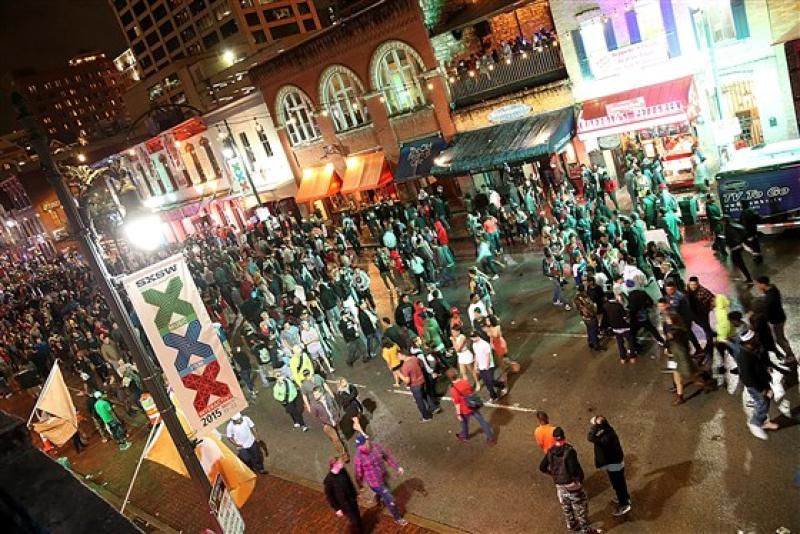Despite social media, Generation Z, Millennials report feeling lonely



Connor Wilton moved here for the music scene. The 24-year-old singer-guitarist “knew zero people in Austin” and felt pretty lonely at first.
While this capital city is one of the nation’s buzziest places and ranks at the top of many “best” lists, Wilton wasn’t feeling it. He lived near the University of Texas at Austin but wasn’t a student; he said walking through “the social megaplex that’s UT-Austin” was intimidating, with its almost 52,000 students all seemingly having fun.
“You definitely feel like you’re on the outside, and it’s hard to penetrate that bubble,” Wilton said.
Austin attracts thousands of newcomers with its thriving economy — heavy on tech, startups and entrepreneurs. And with each year’s South by Southwest (SXSW) Conference & Festivals — a major interactive, music and film festival opening Friday — some of those visitors also move here. Apple is planning a $1 billion expansion that will make Austin the company’s largest hub outside of California. The median age of Austin residents is 32.7 .
But Austin also ranks at the top among cities with lonely folks in a national survey by the global health service company Cigna. Nearly half of the 20,000 adults surveyed last year reported sometimes or always feeling alone (46 percent) or left out (47 percent). Generation Z (ages 18-22) and millennials (ages 23-37) rated themselves highest on feelings associated with loneliness.
Loneliness, with its well-documented ill effects on health, has been called an epidemic and a public health threat, especially among the elderly. But now experts are finding that the always connected social media mavens in the country’s younger generations report being lonely.
“Younger people are genuinely surprised to ever feel lonely and are really overwhelmed by it,” said Dawn Fallik, an associate professor at the University of Delaware in Newark who’s working on a book about loneliness.
She, along with Julianne Holt-Lunstad, of Brigham Young University in Provo, Utah, was scheduled to speak at SXSW Friday at two sessions called “Generation Lonely: 10,000 Followers and No Friends.” The close look at loneliness among these techno-connected young people drew so many registrants, SXSW this week added a repeat session at the end of the day.
“They’ve been surrounded by conversation their whole lives, so when that silence happens, they have a hard time just being in it and they take it that there’s something wrong,” Fallik said.
Holt-Lunstad, a professor of psychology and neuroscience and director of Brigham Young’s Social Connections and Health Research Laboratory, said, “The question that remains is ‘Is this just a developmental stage, or is there something different about this younger generation that hasn’t been true of younger adults in previous generations?’”
Holt-Lunstad cited research by psychologist Jean Twenge of San Diego State University that “does suggest this generation of adolescents is indeed lonelier than previous generations.”
Fallik said young adults may think more about their own loneliness, prompted by celebrities focusing their attention on being lonely, including Lady Gaga in her 2017 documentary.
Daniel Russell, a professor of human development and family studies at Iowa State University, said the conflict between how many close friends you’d like to have and how many fewer you actually have may create feelings of loneliness and social isolation. A current study he’s working on about the relationship between social support and loneliness includes a review of 200 studies and suggests the quality of the relationships may be more significant than the quantity.
“What you see is that some people say they are lonely yet report a lot of close friends. Arguably, they’re not socially isolated,” he said.
Russell said studies about the effects of social media have found “virtually no relationship between loneliness and social media.”
“What struck me about the Cigna data is they weren’t finding very strong relationships [between loneliness and social media] either — that it was not statistically significant with 20,000 participants,” he said.
However, some experts, such as Holt-Lunstad, suggest examining how millennials and Generation Z use social media.
“It could be used to connect with others in a way that facilitates getting together, and that could be very positive,” she said. “But scrolling through someone’s feed or social comparisons might be negative.”
In last year’s Cigna study, Generation Z had the highest score on the UCLA Loneliness Scale, the standard measurement for loneliness research.
Its 17 regional surveys found that 60 percent of Austinites reported loneliness compared with 54 percent nationally. Of those surveyed, 60 percent said they sometimes or often feel no one knows them well.
One reason for such feelings is the city’s population growth, which amounts to 152 newcomers a day since 2010, according to an Austin Chamber analysis of U.S. Census data released two weeks ago.
“It’s a super-transient city,” said Elliot Meade, 27, who moved in August from New York City to work in finance.
“The first couple of months were challenging, but I say that in the context of never having moved to a place where I never had roots before,” he said. “I live alone. I would have probably preferred to have roommates. I didn’t know anyone, and I did not want to roll the dice on a stranger. I had to go out of my way to be social and find common ground and build relationships.”
Unlike young workers of older generations, these young adults are less likely to join professional associations, Rotary Clubs or other groups to meet peers. And the organizations don’t provide the value of connections and resources they once did now that people can find everything they need with a click.
“What comes up over and over again is how scary it is for them to reach out,” Fallik said. “We have lost those social skills when somebody is sick and you bring them soup or somebody died and you have that visit. We’ve lost that ability to have those talks, and because we don’t have that now, my students are terrified at those conversations where you’re looking them in the eye.”
However, David Stillman, an author and expert on generational differences, said moving to a new place is a life transition that’s daunting no matter the age.
“Anyone moving to a new place is in transition and is going to conjure up lonely feelings,” he said. “I think about my 81-year-old mother-in-law who moved from Florida to Minneapolis. The first few months, she had massive loneliness. I’m not sure if that’s any different from my nephew who went to the University of Michigan in the fall as a freshman and the first few weeks was a little lonely.”


I kind of felt bad for the kid. I was in Austin and I found it hard to believe that anyone could feel alone is such a friendly city... but read on.
You can be very disconnected while being connected.
Despite social media, Generation Z, Millennials report feeling lonely
A bit of a paradox is it not?
Just a geezerly suggestion would be to dispense with the social media and actually attempt socializing (if such things are still done)
Bravo !
Right on !
Fist Bump !
Tech isn't always what it's cracked up to be....but it can make folks "Wack" for sure !
Won't someone help me take care of my FB farm please ?
I think part of the root cause is the population explosion and areas with high density populations. You become just an object and feel like an ant in an ant farm.
I’ve been traveling for work related and family issues a lot these last two years and every time I leave my home town area I feel like an outsider because the culture is so different. I don’t have the people around me that share the same interests. At home I can’t go anywhere without strangers smiling at me and vice versus. If you make eye contact with a stranger on the street there a friendly smile or head nod is customary. Friendly vocal communications often related to the mountain conditions, river or musical activities in the area are daily occurrences. It is part of the culture to spread positive vibrations to everyone you encounter even in the grocery store. It is easy for me to make friends there because we have similar interests.
I’m currently in southwest Florida and here I feel totally out of touch with the culture of the area. You can walk down the street and smile and wave at everyone you come across and about half of them don’t even smile and wave back. Some look at you like you’re nuts. After a while you stop waving and smiling because you realize you are an outsider and that is not part of the culture here. Other than fishing and many of them do not fish here it is hard for me to find binding things that draw people together and create lasting friendships in this area. I feel like an ant in a concrete jungle here. It’s great for the people that like this culture but it’s not my cup of tea.
I think the key to building these lasting deep friendships is finding people with similar interests and then participating in activities together with them that create lasting memories of the adventures you embarked on. Even if your adventures together involved hardships and struggles together the bond will form possibly even deeper than if your time together was only pleasant experiences.
Technology WILL create a dystopia. We are in the infancy stages of it .
I think this is a lot of it. My hometown used to have a "Welcome Wagon" - new families moving in would be met with casseroles, cookies, and help and advice on settling in. We don't do things like that anymore. Viewings or family nights at a funeral home used to be a time when you'd visit with the family and offer condolences, and now I know people who show up only to sign the guest register, and never actually speak to the bereaved family. We seem to have forgotten how to introduce ourselves, or how to interact at times when interaction used to be expected.
Recently moved, no welcome wagon (must have heard about me), lots of post cards offering discounts, services and the like:)
That to one side, it is kind of a crazy paradox of sorts, folks want to wrap themselves in the anonymity of the internet but yet decry the anonymity of their lives as a result. Canines I understand, humans not so much.
I guess it's hard to make friends when your head is in your phone.
Generation Z, Generation X...?.
I'll go wit generation P
.
Bunch of whining little Pussies,
some ,
ironically grabbing on to Trump.
None, however
seem to take on the personal responsibility of 'life is what you make it' and if you make it death, well rest your soul" .
.
These generations no longer know how to look into another's eyes to socialize
as
has been stated
This is to be expected, because change is a metaphorical creature with two-heads! Something gained; something squandered in exchange.
I first observed this kind of outcome when we decided to put televisions in all the bedrooms in the house. Mind you, it did not immediately occur to me what a mistake that was >>>before, we knew what was being 'fed' to the household. After separate television 'stations' nobody, including me, wanted to sat down and talk with other miserable family. We simply enjoyed the stresslessness of being in me-time and our very own orbit!
Unfortunately, that is when the trouble materialized: A family member would ask for some time to sit and talk and we simply did not have it to present. We grew apart mentally. We broke the face-to-face bond. Now for good or ill we only do sat downs for emergencies, repairs, or deaths.
I mean where can we find the time to 'look up.'?
NOTE: Making matters odder: four year olds and up have computerized tablets and first graders are 'packin' cellphones. While it seems these little "celestials" are becoming more fluent in a number of activities at an early age, change, the two-headed creature, will squander something in each of them away in exchange. Watch out!
What a crock...... Use to be someone would say...."Put down the pipe." Today its..."Put down the phone."
My wife and I like to think we can talk to rocks. Both of us can strike up a conversation with just about anyone just standing in a checkout line. You just have to want to talk to people. I just cant say I have any sympathy.
Mine compliments EVERYONE in almost any situ, their eyes, lashes, brows, teeth, unique names, height, hair, skin etc
and 6 times out of ten the person says "Thank you so much, today of all days, I needed to hear that", and they hug. Sometimes they cry.
I smile and nod, observing.
I tend to talk to animals and insects, and she swears they understand me.
I should be as lucky here, lol.
...
People light up when we ask.."How is your day going?"
Something so simple to do that starts a conversation.
I agree. I talk to people all the time. In line, people walking their dog, whatever.
Some people act like they don't want to talk but most people are receptive.
Damn these smart phones, I reading my audible book or reading books on it now. So when I am in a line or office waiting room >>I am disconnected from my other great pass-time: chatting with the 'guy or gal' in the next seat. Though, for a treat sometimes I stow the earbuds and chat away!
reading my audible book or reading books on it now. So when I am in a line or office waiting room >>I am disconnected from my other great pass-time: chatting with the 'guy or gal' in the next seat. Though, for a treat sometimes I stow the earbuds and chat away!
That sounded backwards to me.
I think a lot of things like this are hype. I have seen younger generations out and about, in groups, at bars, restaurants, etc.
I have seen people my age and older with their eyes locked on a screen.
People have always had anxiety, always will.